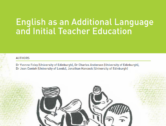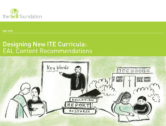Explore our policy recommendations for breaking down language barriers
in schools, adult education, and the criminal justice system.
English as an Additional Language and Initial Teacher Education
This research aims to investigate the extent to which Initial Teacher Education programmes in England are preparing student teachers to meet the language and literacy needs of EAL learners.
About the research
The Centre for Education for Racial Equality (CERES) at the University of Edinburgh, The Bell Foundation and Unbound Philanthropy have published an executive summary of the report ‘English as an Additional Language and Initial Teacher Education’. The research surveyed student teachers at nine sites, encompassing different routes into teaching qualifications, different types of institutions and different English regions.
The policy framework for inclusion specifies that pupils learning English as an Additional Language are placed in mainstream classrooms; and the National Curriculum Statutory Guidance (2014, Section 4.5) sets out clearly that teachers must ‘take account of the needs of pupils whose first language is not English’ it follows that the needs of these pupils should be addressed within teacher education programmes. Therefore, the research was undertaken to develop an understanding of how, and to what extent, English as an Additional Language is taught as part of these programmes.
Research Aims:
The general aims of the study were:
- To investigate the extent to which Initial Teacher Education programmes in England are preparing student teachers to meet the language and literacy needs of EAL learners
- To design resources to extend the knowledge base of teacher educators and student teachers in relation to meeting these needs
To carry out these general aims the research team gathered teacher educators’ and student teachers’ views on:
- To what extent their ITE programmes prepare student teachers to meet the language and literacy needs of learners with EAL
- To what extent teacher educators feel prepared to extend the knowledge base, skills and practices of student teachers as the latter try to meet the language and literacy needs of EAL learners
Key findings:
The report found that:
- Over three quarters (75.9%) of respondents, who were in the late stage of their training, identified class teachers of subjects other than English as having a large responsibility to support EAL learners
- Confidence improved across the duration of the training, however, 18% still had little confidence in their ability to support EAL learners, whilst 43% had some confidence, 35% were confident and 4% very confident
- Those training the student teachers also lacked confidence in their own knowledge, lacked experience with EAL learners when they were mainstream teachers and lacked systematic professional development on EAL
- Around half of student teachers responded that they did not receive any input concerning EAL while in schools
Key Recommendations:
The report makes a number of recommendations for both ITE providers and policy-makers which include:
- Re-contextualising what is already being taught in ITE programmes to embrace a more inclusionary perspective on languages and literacies and to enable teacher educators to provide opportunities for student teachers to plan for diversity
- Incorporating the following messages and topics into all ‘core’ sessions on EAL for student teachers and to reinforce them throughout the programme:
- The value of the use of home languages in the classroom
- The importance of developing a wider knowledge about languages, beyond the necessary knowledge about the English language to prepare student teachers to teach the grammar and spelling content of the National Curriculum, to include a clear sense of how structures and forms differ across languages which will enable them to act in a more aware way towards EAL learners
- The cognitive and emotional demands of moving between languages. The report recommends presenting this topic through experiential activities which give student teachers an approximation of the problem-solving and inferencing involved in moving between the structures and vocabulary of another language and those of English.
Viewing Initial Teacher Education as only the first stage in a career-long process of professional development and enhancement of practice so that all teachers can be adequately prepared to meet the needs of EAL pupils - Viewing EAL not as a specialised area of expertise, but changing the accent to assisting student teachers to make all lessons more accessible to the multilingual, multicultural classes that they will encounter in many English schools
- Adopting a ‘dual approach’ to developing EAL practice within teacher education programmes so that student teachers not only gain expert EAL knowledge, but that this is infused across all subjects and within all core concerns in order to make all lessons accessible for EAL learners
The next stage will be the publication of research-informed professional development resources designed to extend the knowledge base of both teacher educators working in Initial Teacher Education settings and their student teachers in relation to meeting the language and literacy needs of pupils with EAL.





